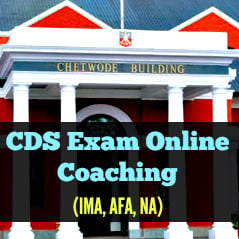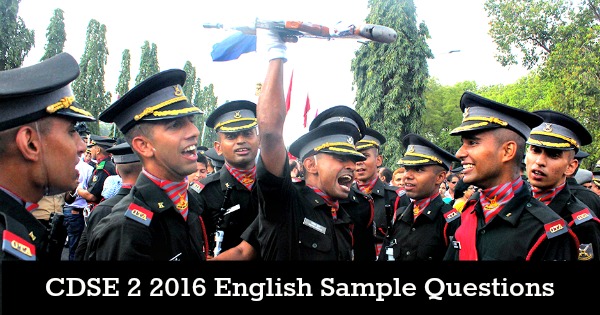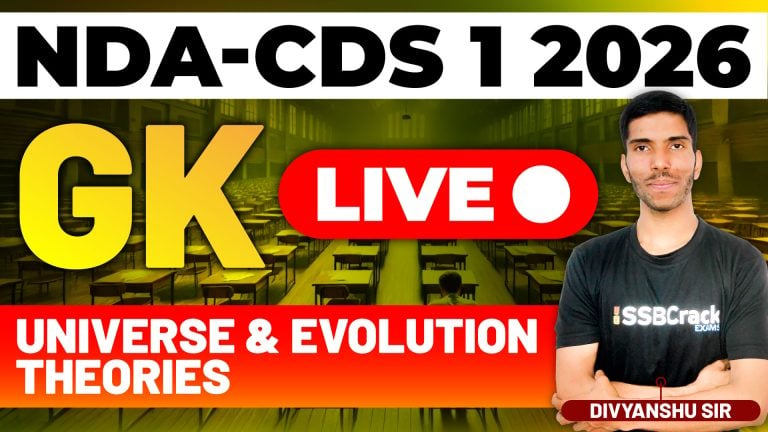CDS 2 2016 exam is going to be conducted in the month of November by UPSC. Candidates preparing for stream IMA NA AFA or only OTA both have to write the General English paper in CDS 2 2016 exam, In this article we will see some CDSE 2 2016 English Sample Questions from Error Detection similar to questions from CDSE exam papers.
CDSE 2 2016 English Sample Questions
- Neither of the two boys (a)/ is sensible (b)/ enough to do this job. (c)/ No error (d)
Answer (d) The sentence is correct. - They left (a)/ their luggages (b)/ at the railway station. (c)/ No error (d)
Answer (b) Use ‘luggage’ in place of luggages. Luggage is an uncountable noun. - You will get (a)/ all the informations (b)/ if you read this booklet carefully. (c)/ No error (d)
Answer (b) Use ‘information’ in place of informations. Information is an uncountable noun. - She sang (a)/ very well, (b)/ isn‘t it ? (c)/ No error (d)
Answer (c) It should be ‘didn’t she’. The sentence is in Past Tense. - He is working (a)/ in a bank in New Delhi (b)/ for the past several months. (c)/ No error (d)
Answer (a) Use ‘has been’ in place of ‘is’. The sentence is in Present Perfect Continuous Tense. - He had lost a ring in the sand and (a)/ I helped him search for it, (b)/ but it was like a look for a
needle in a haystack. (c)/ No error (d)
Answer (b) There is no need to use ‘for‘ with search. Search itself implies to search for‘ lost ring in the sentence. - The Ganges and (a)/ it‘s tributaries constitute (b)/ one of the largest river-systems in the world. (c)/ No error (d)
Answer (b) It‘s is always the abbreviation of ‘it is’ as in ‘it‘s (= it is) a nice day, isn‘t it?’ Its is the
possessive of ‘it’ as in, ‘That is Mohan‘s cat but I don‘t know its name.’ In the second sentence, its
means ‘belonging to it’. So, it should be the Ganges and its tributaries. - The sudden change (a)/ of place (b)/ effected her health. (c)/ No error (d)
Answer (a) For changing the place ‘change in place‘ is better usage than ‘change of place‘. As later one shows the shift or movement. See the usage There is a change in place of marriage venue. There is sudden change of moods after the heated discussion. - There are a number of people (a)/ of every class and nationality (b)/ who doubts the truth of his
statement. (c)/ No error (d)
Answer (c) ‘A number of people‘ is plural and verb-subject agreement should be there in part (c) of the sentence so ‘doubt‘ will replace the ‘doubts‘. - I like this book because the writer has explained (a)/ the reasons (b)/ of his failure truly. (c)/ No error (d)
Answer (d) There is no error in the sentence. - The minister announced (a)/ compensation for (b)/ the victims from the accident. (c)/ No error (d)
Answer (c) Use ‘of‘ in place of ‘from‘. - I should (a)/ have preferred (b)/ to go by myself. (c)/ No error (d)
Answer (d) The sentence is correct. - There is (a)/ no place (b)/ in this compartment. (c)/ No error (d)
Answer (b) Use ‘room‘ or ‘seat‘ in place of ‘place‘. - The (a)/ young man (b)/ had no manner. (c)/ No error (d)
Answer (c) Say ‘had no manners‘. - There are many (a)/ beautiful furnitures (b)/ in the room. (c)/No error (d)
Answer (b) Use ‘articles of furniture‘ in place of ‘furnitures‘.
Passage 1
Light is made up of electromagnetic waves. These vary in length and it is these differences that we perceive as different colours. White light has all the wavelengths of the light spectrum mixed up together. An object looks coloured because light falls on it and it reflects only certain parts of the spectrum. The rest of the spectrum is absorbed by the object. An object that looks white reflects all the light that falls on it. An object that looks red reflects the red part of the spectrum and absorbs the rest. Our eyes detect these different reflected waves and we see them as different colours.
- Without colours we would consider the world a dull and less beautiful place.
- True
- False
- Cannot tell
- White light is an amalgam of all the wave lengths of light.
- True
- False
- Cannot tell
- The passage states that an object that looks blue absorbs all but the blue wavelengths of light.
- True
- False
- Cannot tell
- The colour we perceive an object to be is determined by the electromagnetic waves that it absorbs or reflects.
- True
- False
- Cannot tell
- White paint reflects more light than red paint.
- True
- False
- Cannot tell
Answers
- (c) 2. (a) 3. (b) 4. (a) 5. (a)
Passage 2
Traditionally medicine was the science of curing illness with treatments. For thousands of years people would have used plants and would have turned to priests for cures. In more recent times illness has been attributed less to the intervention of gods or magic and instead to natural causes. Medicine today is as much concerned with prevention as cure. Doctors use treatments of many types, including radiation and vaccination, both of which were unknown until very recent times. Other treatments have been known about and practiced for centuries. Muslim doctors were skilled surgeons and treated pain with opium. When Europeans first reach the Americas they found healers who used many plants to cure illnesses. The Europeans adopted many of these treatments and some are still effective and in use today.
- Modern medicine is the science of curing illness.
- True
- False
- Cannot tell
- Medicine is a science that owes its success to modern treatments.
- True
- False
- Cannot tell
- Vaccination is a relatively recent discovery.
- True
- False
- Cannot tell
- The author of the passage believes that prevention is better than cure.
- True
- False
- Cannot tell
- Practitioners of modern medicine make use of many techniques and technologies.
- True
- False
- Cannot tell
Answers
- (b) 2. (b) 3. (a) 4. (c) 5. (a)
Passage 3
In tropical rainforests the climate remains hot and damp all the year round. In the artic it is cold all year and high up in mountain ranges the climate is much colder than in nearby low lying lands. Climate is not the same as weather. The weather can change quickly whereas the climate describes the likely weather conditions over a much longer period of time. The world is divided into five climate zones. Polar is the only zone where it is always cold, tropical where it is hot all year round, temperate where there are warm summers and cold winters, desert where it is dry and cool, and forest where the summers are cool and short. Great climate changes have occurred, an example of which is the last ice age. Mankind can affect climate when, for example, he causes great forest fi res that create so much smoke that the sun is obscured for months, cooling a region. More recently man has affected the climate as a result of pollution from industry causing the earth to warm through what is called the greenhouse effect.
- The passage states that the weather in high mountain ranges is cooler than in nearby low lying areas.
- True
- False
- Cannot tell
- The passage describes how climate can change.
- True
- False
- Cannot tell
- In a tropical rainforest the climate is the same winter and summer.
- True
- False
- Cannot tell
- In deserts the winter is cooler than the summer.
- True
- False
- Cannot tell
- You can infer from the passage that the artic is a polar climate zone.
- True
- False
- Cannot tell
Answers
- (b) 2. (a) 3. (a) 4. (c) 5. (a)









